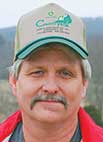 Family and hard work have helped three generations of Skeets ranch and farm their 640 acres near Branch, Ark. After school and his stint in the army, Larry Skeets and his wife, Linda, returned in 1979 to the farm owned by Larry’s father, Raymond. And they have been there ever since.
Family and hard work have helped three generations of Skeets ranch and farm their 640 acres near Branch, Ark. After school and his stint in the army, Larry Skeets and his wife, Linda, returned in 1979 to the farm owned by Larry’s father, Raymond. And they have been there ever since.
“The family has been here since the early 1940s,” said Larry. “We’re all still here. There’s me and my wife and my son, Mac, and two grandsons, Tyler and Slade. Mac is the manager and in charge of day to day operations.”
Mac Skeets pointed to the family’s abilities to diversify their operation and fix many things for themselves as key to why the farm is profitable.
“We raise cattle, chickens, our own hay – we do everything ourselves,” said Mac. “We seldom call a plumber, electrician, mechanic or anything else like that.”
Like his father, Mac went off to school and spent a short time in another career before returning to the family farm.
The Skeets typically run around 400 Angus-cross cattle in their pastures as well as more than a quarter of a million broilers in their 10 chicken houses.
“We started growing chickens for Tyson in 1995,” said Larry. “As far as our business, it’s probably a 50-50 split between the cattle and the chickens.”
Besides cattle and chickens, the Skeets also maintain their own hay operation that typically takes up almost 200 acres of land. “We don’t sell hay, so we use the 5×6 bales,” said Larry. “It’s the same amount of time and trouble to handle smaller bales. If we can get the hay cut early enough, we hold that pasture until late fall for the cattle to graze and save expenses by not having to run the tractors over it again.”
Cost Cutting
Larry and Mac both agree that finding ways to cut costs helps keep their operation profitable.
“I’m not sure people realize how much money it costs to roll a bale of hay,” said Larry. “Or maybe they have more economical tractors. The tractors I have sure love diesel.”
The Skeets see stock pond management as another way to cut costs. They intend to control cattle access to the ponds in order to improve both water quality and herd health. “We’re going to clean out our ponds and put a fence around them, and run a pipe through the dam into a trough with a float on it,” said Larry. “That should help prevent foot rot and the water quality has got to be better that way.”
When it comes to cattle breeding, the Skeets prefer the old fashioned method. “We don’t use AI because it is labor intensive and expensive,” said Larry.
While the Skeets look to family for much of the work, they do employ two other ranch hands. Steve has worked for the Skeets for 10 years while newcomer Anthony has been on the job only a few weeks.
“It’s almost impossible to find good employees,” said Larry. “There are so many more things involved in farm labor. And you can’t pay them what they deserve.”
Industry Changes
During the three decades he’s been at the farm, Larry has seen many changes come to ranching and farming, not all of them good.
“The cost of the operation is changing everything,” said Larry. “Everything goes up every year. Fuel prices affect us tremendously along with equipment prices and parts for the poultry farm. Anything you have to buy has increased dramatically.”
Changes in the cattle market nudged the Skeets to switch from mixed-breed beef cattle and to specialize in Angus-cross cattle starting in 1999.
“We sold all the cattle to get into Angus,” said Larry. “We intended to get into Angus, but it turned out to be very difficult.” Back then, Larry was surprised at how hard it was to find Angus herd stock. “It was very difficulty to find two loads of Angus heifers ready to calve.” The Skeets found their answer from Billy Hall with the Ratcliff Ranch in Vinita, Okla. “Since then, probably 70 percent of our cows and 100 percent of our bulls come from Ratcliff Ranch,” said Larry. “We worked out a buy-back agreement with them for our calves, and it’s worked out very well for me.”
Like many other ranchers and farmers, Larry is concerned about getting younger folks involved with agriculture.
“It’s very important but very difficult,” said Larry. “There’s all the costs and the fact that it’s a seven-day-a-week job and the return on the investment is not there.” Larry hopes that public schools reverse the trend of closing their agri programs. “A program in schools is the easiest way,” said Larry. “Lots of schools are dropping their programs.” Larry’s grandchildren Tyler and Slade attend Charleston Public schools which currently does not have an agriculture program. The Skeets look to keep farming and ranching, but Larry isn’t sure what the future holds for the industry as a whole.







